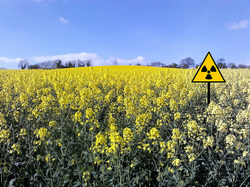
As if this weren't bad enough, they've somehow managed to convince us that artificial fertilizers, pesticides, and genetically modified foods are the only way our planet can survive.
The truth, in fact, is just the opposite!
In reality, if we want to survive as a species, it's only a matter of time before we will find these modern methods completely unsustainable. (Hopefully, we'll figure this out before it's too late!)
Here are the 7 things that make our current model of industrial agriculture unsustainable, and what we need to do in order to fix this mess:
What this means is, are we getting out as much (or more) energy from our food as we are putting in to produce it? For example, are we using MORE energy in terms of fuel, food, etc. to feed an animal than we are getting out of it? When it comes to industrial agriculture, the answer is a resounding yes. In fact, we are expending much more energy to grow our food than we are getting from eating it. I recently read somewhere that for every calorie of factory farmed beef we consume, it takes 3 calories of energy to produce and transport it to your plate! Obviously this is an unsustainable system.
2. Soil Depletion & Erosion
Monoculture crops (see below) disrupt the balance of microorganisms in the soil, and destroy the healthy nutrients that the soil needs to grow healthy food. Without these important organisms binding the soil together, the topsoil erodes at faster and faster rates - meaning we have less and less good soil to grow food on.
3. Aquifer Depletion
By farming in inappropriate locations, and using unsustainable growing methods, we are using up the water in our underground aquifers at alarming rates. (The recent water issues in California are just the beginning!)
4. Factory Farming (Concentrated Animal Feeding Operations)
Animals in CAFOs are typically raised indoors in very tight confines (often they can barely even move), and are fed an unnatural diet of corn and soy products, instead of their natural diet of grass and plants. This unnatural diet causes health problems, which leads to animals being pumped full of antibiotics just to keep them alive until they are sent to the slaughter house. If you're eating conventionally farmed meat and dairy, you're supporting this method of raising animals - like it or not.
5. Monoculture Crops
No matter what part of the country you live in, you are probably aware that in the U.S. the most commonly grown crops are corn and soybeans - and wheat in some areas.
If you're thinking you don't eat that much corn or soy, you would be wrong! Most of the food grown in the U.S. is fed to factory-farmed animals, or turned into processed-food additives which are in just about every form of processed food on every shelf in the grocery store.
Most conventional farms grow ONLY these crops, which means they are depleting the soil (see above), as well as eliminating species of food that may be beneficial to us and the planet. Monoculture means that a sudden plague of a specific pest or disease could very quickly wipe out a large portion of the country's food supply.
6. Food Waste:
Did you know that an estimated 40% of food produced in the United States every year is wasted?!? And unlike in times past, that food truly is wasted. It's not going to feed the garden, or the animals. It's purely being thrown away, so all of those nutrients are being lost from the food system.
7. Toxic Chemicals
Lastly, all those chemical fertilizers, pesticides and antibiotics used in conventional farming today don’t just magically disappear. In fact, we eat a large number of them on a daily basis. The remainder stays in the soil or runs off into the ground water, lakes and rivers. The spread of pesticide residues helps to create more resilient pests, and the pollution of waterways by fertilizers leads to catastrophic consequences for aquatic ecosystems. (Animal wastes from factory farming operations pose a particular problem, as they are no longer composted and converted into natural fertilizers that can be used to replenish the soil; instead, they basically become toxic waste dumps.) (Thanks to Global Resilience Solutions for these excellent insights!)
So What Can We Do?
A reversion to traditional organic and sustainable farming methods may be the only answer.
Considering our food system as a self-sustaining ecosystem that works together as a whole is essential in saving ourselves. In such a system, plants and animals work together to nourish each other and create healthy food products for us at the same time. Animals consume their natural diet of plants, insects, etc. Animal waste then can be composted and recycled back to feed the soil, which grows healthy plants. It is a perfect system - or it was, until we messed it all up!
While you, as a consumer, may not be a farmer, or even a small gardener, you can do your part simply through choosing to support farms that grow food sustainably. (This doesn't always mean organic, although it can.)
Purchase your food from farms that treat their animals humanely (meaning, for most animals, they live outdoors and forage on their natural diet of grass and plants), and raise their produce using methods that nourish the soil rather than depleting it. Buy from local farmers, to cut down on the amount of fossil fuels used in transporting foods to you. Buy from small farms, which grow a wide variety of foods, instead of just one crop.
It may not seem like much, simply to change your shopping habits a bit, but you truly can make a real difference to your health - and the future health of our planet and species - by doing so.
To your health,
Rose.



 RSS Feed
RSS Feed